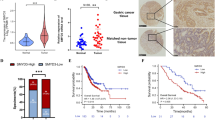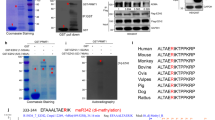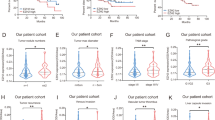Abstract
SET and MYND domain-containing protein 3 (SMYD3), a known histone methyltransferase, was reported to regulate cancer pathogenesis. However, its role in gastric development and progression remains unclear. EZH2 methylation had been associated with cancer metastasis, but the EZH2 methylation status in gastric cancer (GC) is unknown. Here, we report that EZH2 K421 methylation was responsible for gastric cancer cell soft agar colony formation, in vivo metastasis, and macrophage polarization. Mechanically, we identified SMYD3 as the methyltransferase of EZH2 at K421 residue which accelerates EZH2 Ubiquitin proteasome degradation. Cell harboring non-methylated EZH2 mutants promotes gastric cancer cell metastasis. Taken together, our results showed that SMYD3-EZH2 axis restricts gastric cancer metastasis via integrating epigenetic signaling.
This is a preview of subscription content, access via your institution
Access options
Subscribe to this journal
Receive 12 print issues and online access
$259.00 per year
only $21.58 per issue
Buy this article
- Purchase on Springer Link
- Instant access to full article PDF
Prices may be subject to local taxes which are calculated during checkout







Similar content being viewed by others
Data availability
All data generated or analyzed are submitted to the journal.
References
Sung H, Ferlay J, Siegel RL, Laversanne M, Soerjomataram I, Jemal A, et al. Global cancer statistics 2020: GLOBOCAN estimates of incidence and mortality worldwide for 36 cancers in 185 countries. CA Cancer J Clin. 2021;71:209–49.
Bray F, Ferlay J, Soerjomataram I, Siegel RL, Torre LA, Jemal A. Global cancer statistics 2018: GLOBOCAN estimates of incidence and mortality worldwide for 36 cancers in 185 countries. CA Cancer J Clin. 2018;68:394–424.
Zhang JK, Fang LL, Zhang DW, Jin Q, Wu XM, Liu JC, et al. Type D personality in gastric cancer survivors: association with poor quality of life, overall survival, and mental health. J Pain Symptom Manag. 2016;52:81–91.
Diniz TP, da Costa WL, Jr., Gomes CC, de Jesus VHF, Felismino TC, Torres SM, et al. Symptomatic recurrence and survival outcomes after curative treatment of gastric cancer: does intensive follow-up evaluation improve survival? Ann Surg Oncol. 2021;29:274–284.
Sindayigaya R, Dogan C, Demtroder CR, Fischer B, Karam E, Buggisch JR, et al. ASO visual abstract: clinical outcome of patients managed with low-dose cisplatin and doxorubicin delivered as pressurized intraperitoneal aerosol chemotherapy for unresectable peritoneal metastases of gastric cancer. Ann Surg Oncol. 2021;29:112–23.
Zhang XY, Zhang PY. Gastric cancer: somatic genetics as a guide to therapy. J Med Genet. 2017;54:305–12.
Huang J, Gou H, Yao J, Yi K, Jin Z, Matsuoka M, et al. The noncanonical role of EZH2 in cancer. Cancer Sci. 2021;112:1376–82.
Gan L, Xu M, Hua R, Tan C, Zhang J, Gong Y, et al. The polycomb group protein EZH2 induces epithelial-mesenchymal transition and pluripotent phenotype of gastric cancer cells by binding to PTEN promoter. J Hematol Oncol. 2018;11:9.
Guo L, Yang TF, Liang SC, Guo JX, Wang Q. Role of EZH2 protein expression in gastric carcinogenesis among Asians: a meta-analysis. Tumour Biol. 2014;35:6649–56.
Wang C, Li X, Zhang J, Ge Z, Chen H, Hu J. EZH2 contributes to 5-FU resistance in gastric cancer by epigenetically suppressing FBXO32 expression. Onco Targets Ther. 2018;11:7853–64.
Nakagawa S, Okabe H, Ouchi M, Tokunaga R, Umezaki N, Higashi T, et al. Enhancer of zeste homolog 2 (EZH2) regulates tumor angiogenesis and predicts recurrence and prognosis of intrahepatic cholangiocarcinoma. HPB (Oxf). 2018;20:939–48.
Tsou PS, Campbell P, Amin MA, Coit P, Miller S, Fox DA, et al. Inhibition of EZH2 prevents fibrosis and restores normal angiogenesis in scleroderma. Proc Natl Acad Sci USA. 2019;116:3695–702.
Gollner S, Oellerich T, Agrawal-Singh S, Schenk T, Klein HU, Rohde C, et al. Loss of the histone methyltransferase EZH2 induces resistance to multiple drugs in acute myeloid leukemia. Nat Med. 2017;23:69–78.
Jarrell DK, Hassell KN, Alshiraihi I, Crans DC, Brown MA. Structural analysis of SMYD3 lysine methyltransferase for the development of competitive and specific enzyme inhibitors. Diseases. 2021;10:4.
Matsui H, Iriyama T, Sayama S, Inaoka N, Suzuki K, Yoshikawa M, et al. Elevated placental histone H3K4 methylation via upregulated histone methyltransferases SETD1A and SMYD3 in preeclampsia and its possible involvement in hypoxia-induced pathophysiological process. Placenta. 2021;115:60–9.
Liu Y, Deng J, Luo X, Pan Y, Zhang L, Zhang R, et al. Overexpression of SMYD3 was associated with increased STAT3 activation in gastric cancer. Med Oncol. 2015;32:404.
Bottino C, Peserico A, Simone C, Caretti G. SMYD3: an oncogenic driver targeting epigenetic regulation and signaling pathways. Cancers (Basel). 2020;12:142.
Eich ML, Athar M, Ferguson JE 3rd, Varambally S. EZH2-targeted therapies in cancer: hype or a reality. Cancer Res. 2020;80:5449–58.
Zhu L, Zhang C, Xue J, He X, Yin D, Zhu Q, et al. EZH2-mediated epigenetic suppression of lncRNA PCAT18 predicts a poor prognosis and regulates the expression of p16 by interacting with miR-570a-3p in gastric cancer. J Cancer. 2021;12:7069–78.
Ma X, Chen H, Li L, Yang F, Wu C, Tao K. CircGSK3B promotes RORA expression and suppresses gastric cancer progression through the prevention of EZH2 trans-inhibition. J Exp Clin Cancer Res. 2021;40:330.
Kong WQ, Liang JJ, Du J, Ye ZX, Gao P, Liang YL. Long noncoding RNA DLX6-AS1 regulates the growth and aggressiveness of colorectal cancer cells via mediating the miR-26a/EZH2 Axis. Cancer Biother Radiopharm. 2021;36:753–64.
Yuan H, Han Y, Wang X, Li N, Liu Q, Yin Y, et al. SETD2 restricts prostate cancer metastasis by integrating EZH2 and AMPK signaling pathways. Cancer Cell. 2020;38:350–65e7.
Xu J, Wang Z, Lu W, Jiang H, Lu J, Qiu J, et al. EZH2 promotes gastric cancer cells proliferation by repressing p21 expression. Pathol Res Pract. 2019;215:152374.
Hanaki S, Shimada M. Targeting EZH2 as cancer therapy. J Biochem. 2021;170:1–4.
Thienger P, Rubin MA. SETting up for epigenetic regulation of advanced prostate cancer. Cancer Cell. 2020;38:309–11.
Kang SY, Hwang D, Shin S, Park J, Kim M, Rahman MDH, et al. Potential of bioactive food components against gastric cancer: insights into molecular mechanism and therapeutic targets. Cancers (Basel). 2021;13:4502.
Ciraku L, Esquea EM, Reginato MJ O-GlcNAcylation regulation of cellular signaling in cancer. Cell Signal. 2021;13:5365.
Abumustafa W, Zamer BA, Khalil BA, Hamad M, Maghazachi AA, Muhammad JS. Protein arginine N-methyltransferase 5 in colorectal carcinoma: Insights into mechanisms of pathogenesis and therapeutic strategies. Biomed Pharmacother. 2021;145:112368.
Lee YH, Kim SJ, Fang X, Song NY, Kim DH, Suh J, et al. JNK-mediated Ser27 phosphorylation and stabilization of SIRT1 promote growth and progression of colon cancer through deacetylation-dependent activation of Snail. Mol Oncol. 2021;16:1555–1571.
Zhang Z, Li X, Yang F, Chen C, Liu P, Ren Y, et al. DHHC9-mediated GLUT1 S-palmitoylation promotes glioblastoma glycolysis and tumorigenesis. Nat Commun. 2021;12:5872.
Guo J, Zheng J, Zhang H, Tong J. RNA m6A methylation regulators in ovarian cancer. Cancer Cell Int. 2021;21:609.
Teng PC, Liang Y, Yarmishyn AA, Hsiao YJ, Lin TY, Lin TW, et al. RNA modifications and epigenetics in modulation of lung cancer and pulmonary diseases. Int J Mol Sci. 2021;22:10592.
Sanese P, Fasano C, Simone C. Playing on the dark side: SMYD3 acts as a cancer genome keeper in gastrointestinal malignancies. Cancers (Basel), 2021;13:4427.
Huang L, Xu AM. SET and MYND domain containing protein 3 in cancer. Am J Transl Res. 2017;9:1–14.
Giakountis A, Moulos P, Sarris ME, Hatzis P, Talianidis I. Smyd3-associated regulatory pathways in cancer. Semin Cancer Biol. 2017;42:70–80.
Li Z, Wang D, Chen X, Wang W, Wang P, Hou P, et al. PRMT1-mediated EZH2 methylation promotes breast cancer cell proliferation and tumorigenesis. Cell Death Dis. 2021;12:1080.
Adibfar S, Elveny M, Kashikova HS, Mikhailova MV, Farhangnia P, Vakili-Samiani S, et al. The molecular mechanisms and therapeutic potential of EZH2 in breast cancer. Life Sci. 2021;286:120047.
Park SH, Fong KW, Mong E, Martin MC, Schiltz GE, Yu J. Going beyond Polycomb: EZH2 functions in prostate cancer. Oncogene. 2021;40:5788–98.
Heo KS. Regulation of post-translational modification in breast cancer treatment. BMB Rep. 2019;52:113–8.
Li Z, Li M, Wang D, Hou P, Chen X, Chu S, et al. Post-translational modifications of EZH2 in cancer. Cell Biosci. 2020;10:143.
Funding
This work was supported by grants from Jiangsu Cadre health care research project fund (BJ16008) and Jiangsu Province Science and Technology Department (BE2018698). The funders had no role in the study design, data collection, analysis, decision to publish, or preparation of the manuscript.
Author information
Authors and Affiliations
Contributions
PW: data curation, roles/writing-original draft, and funding acquisition. LZ, YR: data curation and methodology. PW: methodology and writing-review and editing. PW: conceptualization and writing-review and editing. All authors read and approved the final manuscript.
Corresponding authors
Ethics declarations
Competing interests
The authors declare no competing interests.
Consent for publication
Not applicable.
Ethics approval and consent to participate
The collection of human tissues was approved by the Ethics Committee of Nanjing PuKou Central Hospital. Sixty patients diagnosed with GC were recruited and signed informed consent to participate in this study. Animal protocols were designed following the guideline and received approval from the Institutional Animal Care and Use Committee of Nanjing Pukou Central Hospital.
Additional information
Publisher’s note Springer Nature remains neutral with regard to jurisdictional claims in published maps and institutional affiliations.
Rights and permissions
Springer Nature or its licensor holds exclusive rights to this article under a publishing agreement with the author(s) or other rightsholder(s); author self-archiving of the accepted manuscript version of this article is solely governed by the terms of such publishing agreement and applicable law.
About this article
Cite this article
Wang, P., Zhao, L., Rui, Y. et al. SMYD3 regulates gastric cancer progression and macrophage polarization through EZH2 methylation. Cancer Gene Ther 30, 575–581 (2023). https://doi.org/10.1038/s41417-022-00535-5
Received:
Revised:
Accepted:
Published:
Issue Date:
DOI: https://doi.org/10.1038/s41417-022-00535-5



